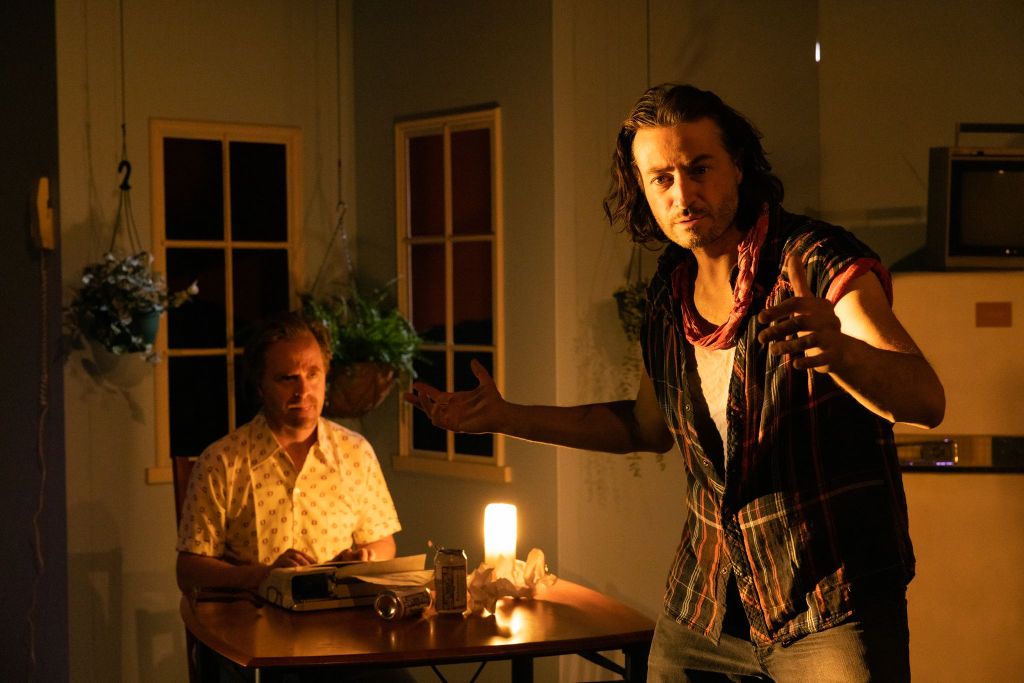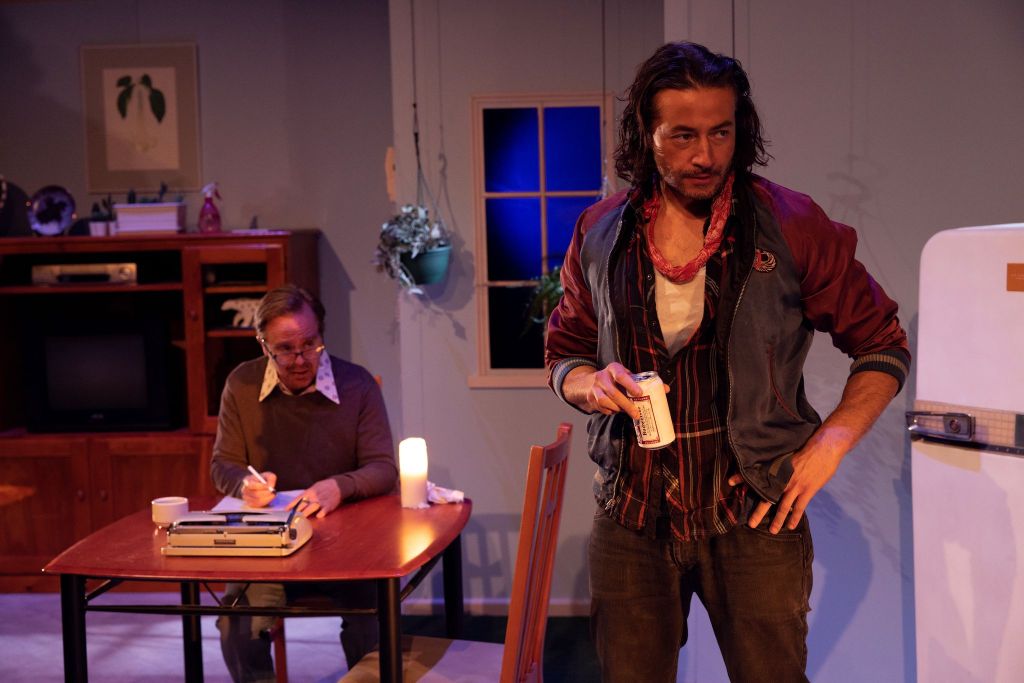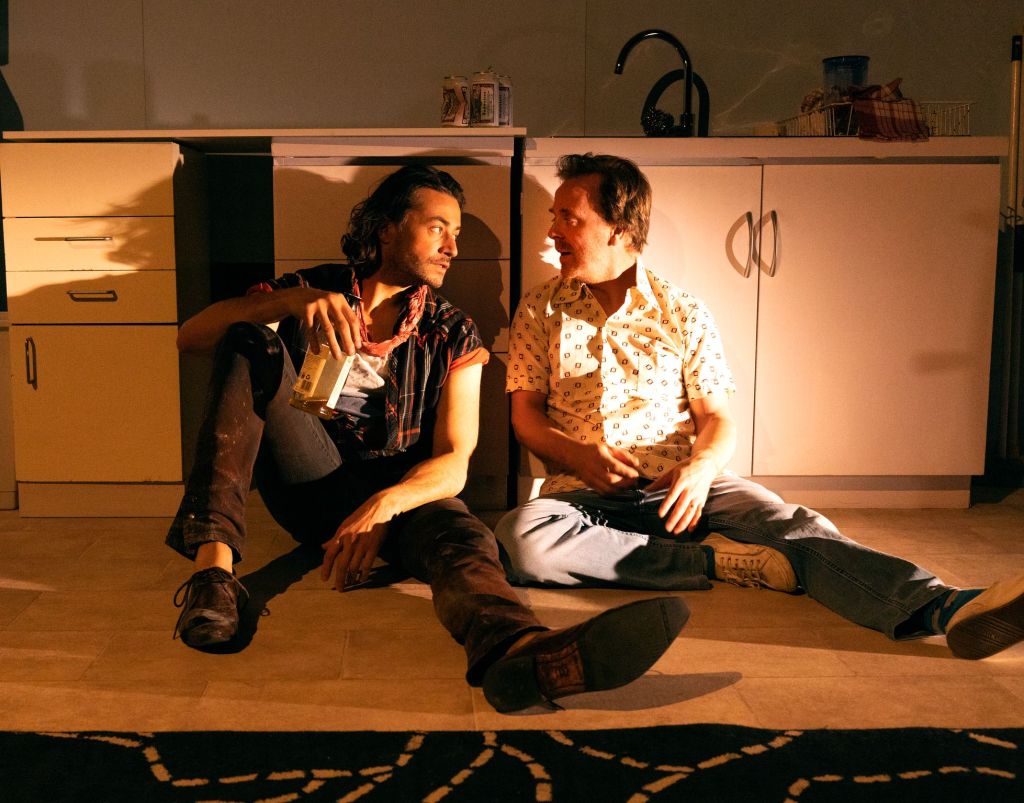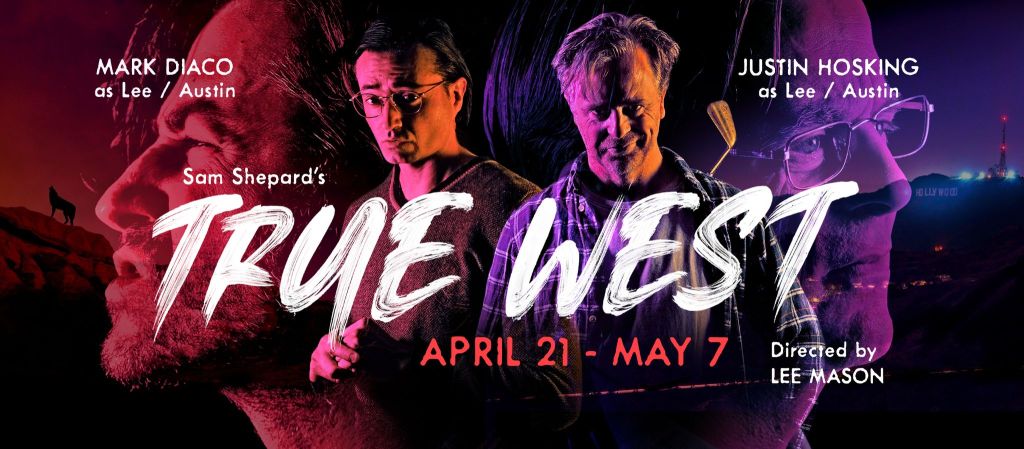On paper, True West is a play written in 1980 by American playwright, actor, screenwriter and director, Sam Shepard, centred around sibling rivalry and a dysfunctional family. In the flesh however, it translates into a menacing, apprehensive, complex and riveting piece of theatrical prowess, pulling forth a visceral response from audiences as guttural as the coyote howls that comprise the play’s soundtrack. The air is thick with tension from the first line and you feel as though the slightest exhale of breath could disturb the realm of these characters; the silence between them as deafening as the moments of threatened violence.
Impressively, the two main characters are acted by both leads – the actors switching roles and alternating each night of the season. Interestingly, a swathe of Hollywood heavyweights have played the title roles, including Philip Seymour Hoffman and John C. Reilly (who alternated roles), Tommy Lee Jones, Peter Boyle, John Malkovich, Gary Sinise, James Belushi, Erik Estrada, Tim Matheson, Dennis & Randy Quaid, Bruce Willis, Ethan Hawke and Paul Dano. The final performance of True West that I attended at Forty Five Downstairs billed Mark Diaco as Lee and Justin Hosking as Austin (both actors are Co-Founders of Human Sacrifice Theatre). Directed by Lee Mason, the play’s production values were impressive with Set & Costume Design by Peter Mumford, Lighting Design by Kris Chainey, Sound Design by Dmitri Golovko and Stage Management by Teri Steer.
The characters of Lee and Austin begin the play as polar opposites. The latter an Ivy League, university educated screenwriter who is married with children, whilst the former is his estranged brother who is a vagrant, thief and somewhat of a loner. The two find themselves at their mother’s house whilst she is away in Alaska and things come to a head when Austin’s Hollywood producer, Saul Kimmer (played by Kevin Summers), prefers Lee’s Western film idea, and ultimately chooses it over Austin’s script. Roped into writing the screenplay for his brother, Austin ‘s repose starts to crack, as Lee’s ambition takes off, and we see a transformation take place.
Diaco’s powerful portrayal of Lee is stamped by nuance; a dissidence between the darkness that overshadows him and the splices of light that penetrate. For all the violence, there is vulnerability. For all the anger, there is sadness. For all the hate, there is a longing for understanding. Diaco’s Lee has a beguiling presence, his southern drawl accentuated by his alcoholism, in contrast to Austin’s astute Californian articulation. Hosking’s Austin initially sits with head down writing at the table or stands with hands in pockets, always with uncertainty written across his brow, hands trembling and fear growing. Whilst Diaco’s Lee prowls the stage with a staggering gait that gives the character a sense of unpredictability, all the while his eyes are sharp and lit up with menacing force as he focuses on his target. It is both confronting and mesmerising, as the intensity in which Lee and Austin interact means that you are totally transfixed and couldn’t dare look away.




Despite the anger, savagery and tenebrosity that plagues Lee, there are moments of remorse that manage to filter through his eyes after he has threatened Austin. A realisation that he has once again overstepped a brotherly boundary. And Austin always seems to bounce back after the turmoil, trying to change the mood by deflecting every which way but inwards. There is a fragmented tenderness between the two men that is frayed and although there are fleeting moments of connectedness, the cycle of drinking and abuse continues and, above all, we realise that there is an impending sense of hopelessness that resonates to the core of the story.
I was not expecting True West to have elements of dark comedy, but there are moments where you find yourself laughing out loud, in spite of yourself and the situation. As Austin starts to unravel and become a mirror image of his brother, his foray into theft is hilarious. To prove his worth to Lee, Austin manages to steal appliances from neighbouring houses (a feat his brother had taunted him with – “You couldn’t steal a toaster without losing your lunch”) and in turn creates a comical yet highly efficient production line of toasters, made especially funny by Austin’s drunken state. The laughter is quickly snuffed as Lee goes on another rampage, destroying half the kitchen (we’re talking broken drawers, wooden bowls kicked at full force, utensils flying, and crushed pretzel pieces everywhere, not to mention the number of toast casualties). Cue Mom, played by Fiona Stewart, who walks in on the chaos, only to ask about how her house plants are going. It would be laughable if it wasn’t so frightening. Her disconnect to her children is at once sad and startling. As the fighting escalates, we see the final transition of Austin, who attacks Lee with a telephone cord, trying to strangle him. At the beginning of the play you wonder how these brothers could have turned out so differently, but by these final moments you realise just how similar they actually are. Perhaps the primordial nature of siblings is transcendent, and the oppressed will inevitably morph into their oppressor. The demons that hide within can only be kept at bay for so long… As Lee comes to, the two brothers stare each other down in a way so menacing you realise that the transformation is complete, and as the lights fade, you are left wondering just which brother will ultimately go too far.
Both actors are astounding in their performances, and it is mind-blowing to think that they swap roles, considering how all-encompassing these characters are, both physically and mentally. Both Diaco and Hosking deliver masterful portrayals – at once stirring, intimate, powerful, poignant and electrifying. The two actors showcase with intricate emotions the inner workings of a dysfunctional sibling relationship, bombarded by toxic masculinity, longing for connection and the consumption of wanting to prove themselves worthy. It is to their merit that this play is often referred to as ‘a masterclass in acting’ as it demands a special kind of actor willing to plunge head first into the roles of Lee and Austin. Both Diaco and Hosking have left an enduring timestamp on audiences’ minds with their absolutely flawless performances.


